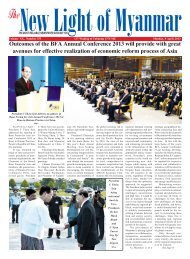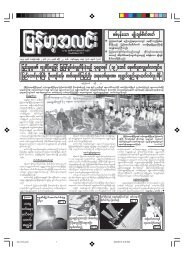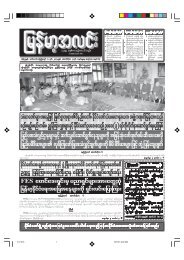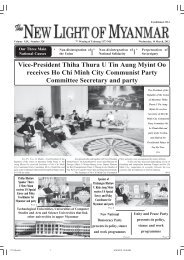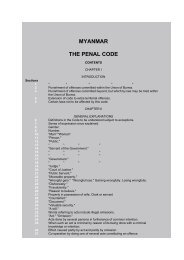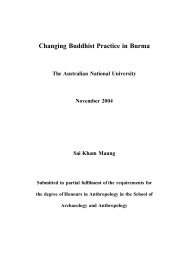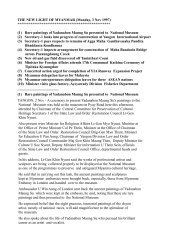Presidential adviser sues 13 farmers for trespassing - Online Burma ...
Presidential adviser sues 13 farmers for trespassing - Online Burma ...
Presidential adviser sues 13 farmers for trespassing - Online Burma ...
Create successful ePaper yourself
Turn your PDF publications into a flip-book with our unique Google optimized e-Paper software.
www.mmtimes.com<br />
China’s debt-fuelled<br />
growth outlives Bo Xilai<br />
Credit-financed construction projects continue in Chongqing following trial<br />
Tom Hancock<br />
FALLEN Chinese politician Bo Xilai<br />
may have been ritually consigned<br />
to political history at his trial this<br />
week but the country’s leadership<br />
has yet to abandon the debt-fuelled<br />
economic policies he epitomised.<br />
Bo, who mounted a feisty defence<br />
at his five-day trial, won plaudits<br />
<strong>for</strong> his trans<strong>for</strong>mation of the<br />
southwestern megacity of Chongqing,<br />
where he became the city’s<br />
top official in 2007, funded by billions<br />
in loans from state-controlled<br />
banks.<br />
His fingerprints are visible everywhere<br />
in the sprawling metropolis,<br />
from a new light rail system that<br />
snakes across its undulating hills,<br />
to more than 3000 kilometres (1900<br />
miles) of motorways and 48 new<br />
bridges government documents say<br />
were built during his tenure.<br />
Chongqing’s expansion began<br />
with China’s “Develop the West”<br />
campaign to promote growth in the<br />
vast and relatively poorer region in<br />
the late 1990s.<br />
Bo’s supercharged version of a<br />
growth model followed by cities<br />
across China – funded by loans using<br />
land as collateral – made it the<br />
country’s joint-fastest-growing region<br />
in 2011, with an annual GDP<br />
rise of 16.4 percent, according to official<br />
statistics.<br />
Liabilities held by government<br />
financing vehicles in Chongqing<br />
swelled by 184 billion yuan ($30<br />
billion) under Bo, according to an<br />
analysis by Dow Jones newswires<br />
– around US$1,000 <strong>for</strong> every man,<br />
woman and child in the municipality,<br />
which ranks among the biggest<br />
cities in the world.<br />
Bo’s economic policy could be<br />
summarised as: “Take enormous<br />
amounts of money from the central<br />
government, you spend it, making<br />
your city a better place and making<br />
yourself a hero in the process,” said<br />
James McGregor, chief of greater<br />
China operations <strong>for</strong> consultancy<br />
APCO Worldwide.<br />
Bo and Chongqing’s government<br />
“went full-speed ahead on re-doing<br />
‘Chinese governments<br />
... build skyscrapers,<br />
town squares, roads<br />
and bridges and<br />
amass huge amounts<br />
of debt.’<br />
Chen Gong<br />
Advisor to local officials<br />
the city, which happened all over<br />
China – and now they’ve got to figure<br />
out how to pay <strong>for</strong> it”, he added.<br />
Spending included 34 million<br />
square metres (366 million square<br />
feet) of subsidised housing <strong>for</strong><br />
Chongqing’s poorer residents, part<br />
of populist policies Bo touted as an<br />
attempt to reduce the wealth disparities<br />
that have soared in China<br />
in recent decades.<br />
“Bo demolished old houses and<br />
gave people new ones, which were<br />
bigger,” middle-aged Chongqing<br />
resident Zhang Renliang said. “He<br />
had good connections – he was able<br />
to make things happen.”<br />
“Chinese governments... are the<br />
world’s largest property developers,”<br />
said Chen Gong, chairman<br />
of Beijing Anbound In<strong>for</strong>mation,<br />
a Chinese think-tank that advises<br />
local officials, adding: “They<br />
build skyscrapers, town squares,<br />
roads and bridges and amass huge<br />
amounts of debt.”<br />
Some have touted a party plenum<br />
this autumn as a possible opportunity<br />
<strong>for</strong> re<strong>for</strong>ms that could<br />
leave behind the Chongqing model<br />
followed by Bo.<br />
Nonetheless Chen said: “There<br />
will be some proposals, but it will<br />
just be a matter of slogans. I don’t<br />
think leaders have a way to change,<br />
because of the huge power of special<br />
interest groups.” – AFP<br />
INDIAN business groups warned<br />
that a land re<strong>for</strong>m bill passed by<br />
the lower house of parliament<br />
could jeopardise investment that<br />
is desperately needed to kickstart<br />
the stuttering economy.<br />
The contentious land acquisition<br />
bill is intended to give <strong>farmers</strong><br />
fairer compensation <strong>for</strong> their land<br />
sought <strong>for</strong> development, and replace<br />
a 119-year-old law framed by India’s<br />
British colonial <strong>for</strong>mer rulers.<br />
The bill passed through the<br />
lower house late Thursday last<br />
week, hailed by the government as<br />
a fair balance between improving<br />
landowners’ rights and streamlining<br />
the process of purchasing land<br />
<strong>for</strong> industrial projects.<br />
But business groups warned<br />
the bill would send the cost of<br />
projects “sky-high” and stall investment<br />
in manufacturing, infrastructure<br />
and housing at a time of<br />
decade-low economic growth.<br />
“The industry feels that the<br />
cost of acquiring land <strong>for</strong> the industrial<br />
projects and the realty<br />
sector will go sky-high, which is<br />
something not desirable when<br />
India is facing an economic slowdown,”<br />
said the Associated Chambers<br />
of Commerce and Industry<br />
(ASSOCHAM) in a statement.<br />
The new bill, which must now<br />
be passed by the upper house and<br />
be approved by the president,<br />
stipulates that landowners must<br />
be paid up to four times the market<br />
value of land in rural areas<br />
Property 31<br />
Indian land re<strong>for</strong>m<br />
met with suspicion<br />
Trudy Harris<br />
and two times the value in urban<br />
parts.<br />
It also states the need <strong>for</strong> rehabilitation<br />
and resettlement of<br />
people who have been displaced<br />
by property purchases.<br />
ASSOCHAM secretary general<br />
DS Rawat said a separate requirement<br />
in the bill to obtain consent<br />
from 80 percent of landholders<br />
be<strong>for</strong>e going ahead with a purchase<br />
“will be very difficult, if not<br />
impossible”.<br />
Land acquisition is a politically<br />
charged issue in India, and land<br />
seizures <strong>for</strong> industrial projects<br />
have sparked bitter clashes between<br />
<strong>farmers</strong>, tribal groups and<br />
state authorities.<br />
Huge investments, including<br />
construction of a $12-billion plant<br />
by South Korean steel giant POSCO<br />
in eastern India, have been delayed,<br />
sometimes <strong>for</strong> years.<br />
India’s economy is growing at<br />
its slowest pace in a decade while<br />
the rupee has fallen to record lows<br />
in the last few weeks.<br />
The Federation of Indian Chambers<br />
of Commerce and Industry<br />
said the new bill failed to streamline<br />
antiquated rules <strong>for</strong> buying<br />
land, warning that the process<br />
would instead now be “stretched<br />
by four to five years”.<br />
The land bill comes as the<br />
Congress party attempts to push<br />
through key re<strong>for</strong>ms ahead of<br />
elections to kick-start the economy<br />
and douse accusations of policy<br />
paralysis after almost a decade<br />
in power. – AFP






